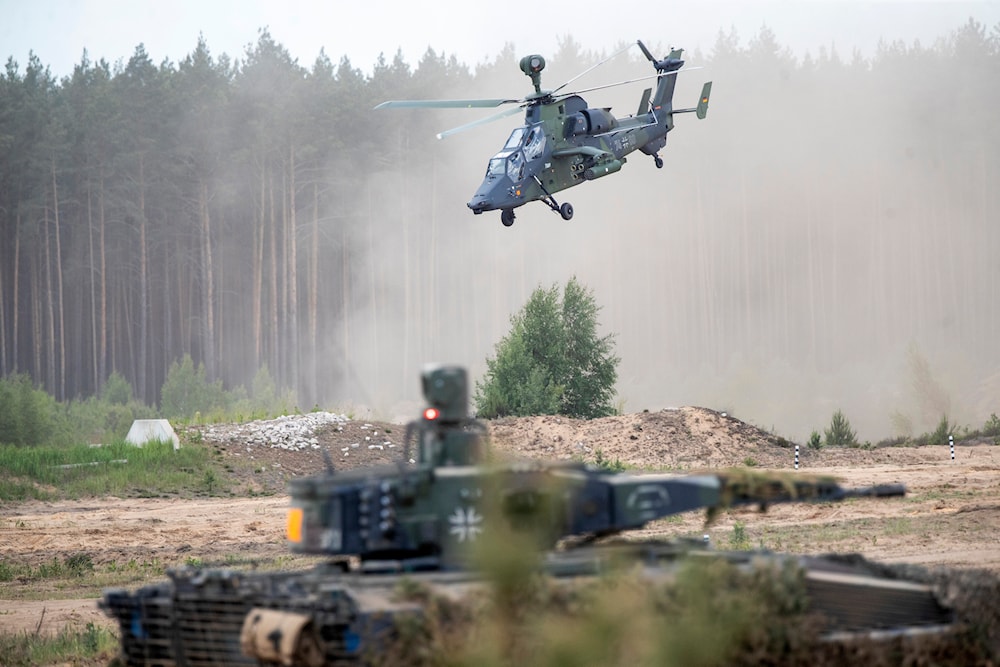Germany developed, approved war contingency plan
[ad_1]
Germany could just be playing it safe, but it could also be gearing up for the consequences of Europe’s backing of Ukraine against Russia.
-
![Eurocopter Tiger of the German Army takes part in the Lithuanian-German division-level international military exercise 'Grand Quadriga 2024' at a training range in Vilnius, Lithuania, May 29, 2024 (AP)]()
Eurocopter Tiger of the German Army takes part in the Lithuanian-German division-level international military exercise Grand Quadriga 2024 at a training range in Vilnius, Lithuania, May 29, 2024. (AP)
The German government unveiled Wednesday a comprehensive new defense plan that includes the potential reinstatement of compulsory military service and the deployment of NATO troops on Europe’s eastern flank.
“As a result of Russian aggression, we have a completely changed security situation in Europe,” Interior Minister Nancy Faeser said. The revamped framework was approved by Chancellor Olaf Scholz’s cabinet on Wednesday, replacing the former plan that had been in place since 1989.
The plan includes mandatory conscription and the redirection of manufacturing efforts to focus solely on war goods. It also outlines potential evacuation strategies for parts of the country and the use of subterranean facilities such as subway stations and underground parking lots as temporary shelters.
Reflecting NATO’s eastward expansion, the revised framework also prepares Germany to support its allies in the Baltic States. “Germany is no longer a frontline state, but serves the allied armed forces as a hub for the alliance in the heart of Europe,” the cabinet declared.
‘Ready for war’ by 2029
Berlin also developed plans to control food distribution, including the stockpiling of wheat and other grains in secret locations and creating an emergency reserve of rice and beans to ensure the German population could receive one hot meal a day, according to German media outlet Bild.
The new defense strategy also encompasses civilian contributions, requiring citizens to take on certain essential jobs such as nursing and baking. Hospitals would need to be prepared for significant increases in patient numbers.
Defense Minister Boris Pistorius emphasized the importance of societal resilience in the face of heightened security threats. “The overall defense of Germany is a task to which we all have to make our contribution, state and civil institutions, as well as each and every one of us,” Pistorius stressed. “We need a resilient society that can deal with the challenges.”
Pistorius also urged German lawmakers to ensure the country is “ready for war” by 2029, advocating for the expansion of the Bundeswehr, Germany’s armed forces, ideally through mandatory military service.
Germany abolished the draft in 2011, and the military has since struggled with equipment shortages as well. A parliamentary report last year indicated that at the current rate of revitalization, it could take up to fifty years to adequately strengthen the German forces.
Germany and other NATO members have expressed concerns about a potential Russian invasion if Moscow emerges victorious from Ukraine, disregarding that Russia’s actions against Kiev have been defense-driven, and escalating further against their eastern neighbor through numerous actions, such as several allies of Kiev’s calling for allowing strikes on Russian soil.
Attacks on Russia
The US has supplied Ukrainian forces with short-range ballistic weapons that extend the precision targeting capabilities of Ukrainian forces to a radius of nearly 300 km at points of deployment.
US President Joe Biden recently lifted restrictions on Ukraine’s use of US-supplied weapons against targets in Russian territory, though officials claim that Biden made the move “only to defend the under-fire” Kharkiv region against Russian forces.
Biden’s approval of strikes has led European NATO countries to suggest similar strikes on Russian territories. This led Russian President Vladimir Putin to caution certain NATO member states to understand the implications of their suggestions of allowing Kiev to initiate strikes on Russian territory.
“These representatives of NATO countries, especially in Europe, especially in small countries, they should be aware of what they are playing with. They should remember that this is usually a state with a small territory and a very dense population. This is a factor they should keep in mind before striking deep into Russian territory,” Putin said during a press conference following his visit to Uzbekistan on May 28.
In his remarks, the Russian President emphasized that Moscow is closely observing such remarks. Putin further addressed NATO Secretary-General Jens Stoltenberg‘s comments regarding potential strikes, stating that Stoltenberg should recognize the indispensable role of space-based reconnaissance for deploying high-precision long-range weaponry.
[ad_2]
Read More:Germany developed, approved war contingency plan


Comments are closed.